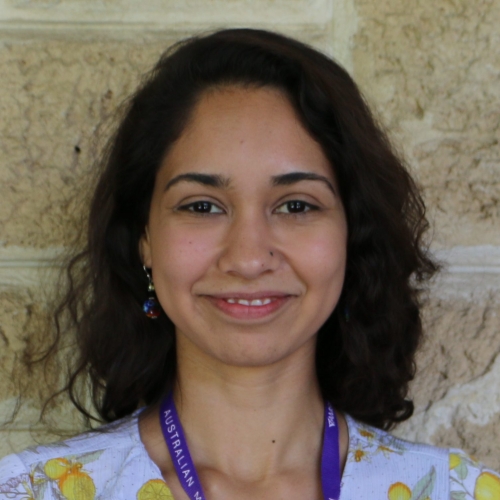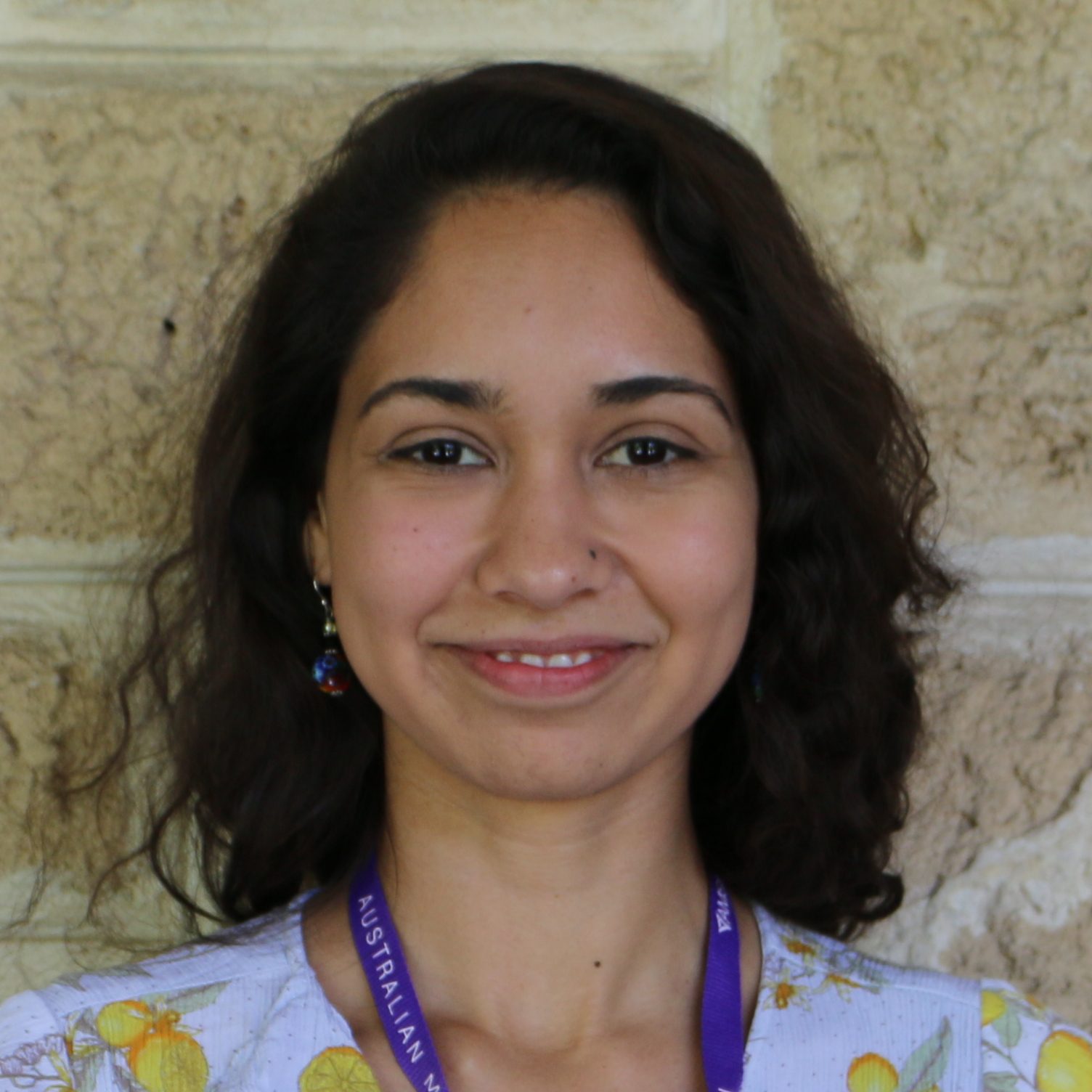
Evelyn Phlox
University of Adelaide
Born in Sydney, and raised during my teenage years in Adelaide, I was absolutely rubbish at all things maths throughout my schooling. When I decided that, despite my seeming lack of aptitude, I wanted to study biology at university and even took up additional maths electives, for fun, I certainly raised a few eyebrows! Since then I am happy to say I did very well in my maths courses, have completed my degree in Molecular Biology, and am currently doing a Master of Philosophy in genetics. I truly fell in love with maths and statistics too, especially in their application to the field of genetics: there are so many big biological questions to be explored using the power of DNA sequencing and mathematical modelling hand in hand, and I hope to pursue a career in this space.
Can you give me a quick overview of the type of mathematics you are studying and its potential impacts for the broader community?
For my Masters project, I am using ancient DNA across many time points to piece together the demographic history of South American indigenous peoples, in particular looking at the effect of European-borne pathogens on the indigenous immune system. It is possible to quantitatively determine the pathogenic burden by observing the rate of change of parts of immune genes and comparing this to the rate of the rest of the genome. Analysing this kind of time-series DNA data can be quite involved and requires the use of Markov chains, maximum likelihoods and a host of different statistical analyses. My work has a lot of implications for South American anthropology and history – for example, if I find that there was only a weak pathogenic burden on the indigenous immune genes, this will imply that the widespread population loss of the native peoples had a more sociological basis (e.g.
warfare, slavery) than a biological one (e.g. disease epidemics), rewriting the whole narrative of European colonisation of the Americas.
You attended AMSI BioInfoSummer, what drew you to this event? What was the most valuable part of AMSI BioInfoSummer for you in terms of furthering your career in mathematical sciences?
The opportunity to be exposed to different applications of maths in many areas of biology was what appealed to me most. Although I’ve done some first-year level maths, I still consider myself a layperson and I was very keen to attend a conference hosted by a mathematical society, but still intended for an lower level audience. The contacts I made, and the wide scope of research projects and ideas will certainly help me with my future research.
Did this event lead to any new projects, collaborations? What were some outcomes in terms of your work?
I definitely met a few people who I hope to keep in contact with, both peers at my own level and more senior researchers. In particular I met a PhD student who has a much a stronger maths background than I, and was very interested in my research topic. I am hoping this will lead to some collaboration in future, as I could certainly use his help!
You received a CHOOSEMATHS Grant to assist your attendance at AMSI BioInfoSummer. How important was this in terms of your ability to attend and fully participate in the sessions throughout the week? How did you hear about the grant?
I’d heard about BioInfoSummer before, but didn’t even imagine I’d be able to afford going until I heard about the CHOOSEMATHS grant through an email sent by my department at my home university. I could not have attended the event without it.
How important are initiatives such as the CHOOSEMATHS Grants in terms of fostering the participation and achievement of women in mathematics, particularly in terms of access to networking opportunities and further training opportunities?
Extremely important! I think any form of encouragement and incentive to aid the participation of women in maths is absolutely crucial – it also has a cascading effect in that women who have been supported themselves will go on to inspire others coming after them. I know personally that I was made even more aware of this issue after attending the conference, and am determined to help other women in pursuing a maths-related career whenever the opportunity arises.
In what ways has the experience impacted your maths studies? Has it influenced the direction of your research?
I think the experience was a very good reinforcement of the direction I already knew I wanted to take my research and my skills development. It definitely broadened my horizons to see so many interesting careers and research topics that I could see myself working in.
The CHOOSEMATHS Grants are part of a broader program being delivered by AMSI Schools with support from the BHP Foundation to turn the tide on Australia’s maths deficit and strengthen maths education and participation of women across the discipline. What do you see as the big challenges facing maths in Australia, particularly for women?
I think there is unfortunately a widespread culture, especially in schools, of maths being ‘useless in the real world’ and/or ‘too difficult’, when that couldn’t be further from the truth. There are also a lot of subliminal expectations, on women in particular, to choose certain career paths, e.g. nursing, vet science, arts etc. Changing this mode of thought on a wider scale is no trivial task. We need to start teaching our young people that you don’t need to be a genius or even have natural aptitude to succeed at maths. You need motivation and willpower more than anything!
Did you always want to pursue a career in maths? Were you encouraged to study these subjects at school?
Growing up I never thought I’d do anything remotely involved with maths. I was terrible at it and I truly hated it. I had a mix of good and bad teachers, but I think the main help in changing my thinking was my older brother – he had a natural aptitude for maths and I really wanted to become better because of him. He was also very patient in explaining concepts in a way that I could understand, because often the ‘standard’ textbook explanations just never clicked with me.
Where do you see yourself in five or ten years time?
I would like to better my maths skills – I am doing a few online courses on the side and hope to get as far as I can. I love the field of genetics that I’m in, but in my future studies and research I would love to explore the interface of genetics and mathematics further, whether I end up in academic research or industry.
Did you learn about new career options available to you that you were not aware of prior to attending AMSI BioInfoSummer?
Yes, some of the speakers and people that I met had worked in roles that I hadn’t really thought of before e.g. working with border security to contain pathogen spreading.
If a peer asked you if they should attend AMSI BioInfoSummer, how would you describe the conference to them?
I would say it was very well organised, with an excellent range and selection of speakers, and that it gives a very good overview of different research areas in biology and how maths and computer science can be applied to answer questions within those areas. Would I recommend they attend AMSI BioInfoSummer 2019? Absolutely!
Any other feedback/comments you would like to provide on the CHOOSEMATHS grant or AMSI BioInfoSummer?
I would just like to say very well done to the organising team; it was a superb, jampacked experience and very eye-opening to many areas of research being tackled with maths and computer science. The combination of broader-picture lectures, hands-on workshops and time to socialise with speakers was excellent and has left a lasting impact on my personal and professional development.

